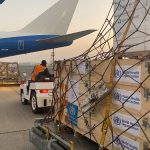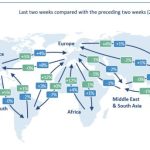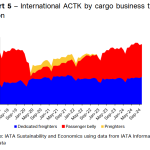Delta Cargo Expanding Horizons
Embracing a dynamic phase of growth and innovation, Delta Cargo combines technology and innovative solutions and its sizeable belly-hold capacity through Delta Air Lines’ over 4,000 daily flights to connect more businesses, e-trade, and economies across continents.
Delta Cargo is the air cargo division of Delta Air Lines, the oldest operating airline in the US which ranks first globally in terms of market capitalization and total assets with its revenue soaring to nearly $62 billion in 2024.
Leveraging the belly space in Delta’s passenger aircraft, with a global network spanning across more than 290 destinations on six continents, Delta Cargo offers comprehensive freight services across the Americas, Europe, Asia, and beyond.
Its commitment to customer-centric innovation, ensuring seamless operations, and tailored services that meet evolving industry demands, sets it apart from the rest of major players in the air cargo industry.
At the heart of Delta Cargo’s strategy is an emphasis on leveraging technology and optimizing its fleet. Recent additions of wide-body aircraft like the Airbus A350-900 have significantly
boosted capacity. And participation in the SkyTeam Alliance and joint venture partnerships with Aeromexico, Air France KLM, Korean Air, LATAM, and Virgin Atlantic enhance reach and service integration. Pioneering initiatives like the new DeliverDirect product, which streamlines package delivery from retailers’ warehouses to consumers’ doorsteps, and its IATA CEIV-certified
Specialized Pharma product highlight Delta Cargo’s innovative edge.
In an exclusive interview with Air Cargo Update, Peter Penseel, President of Delta Cargo, outlines his vision for the future, focusing on operational excellence, digitalization, and doubledigit growth while pushing for more global expansion.
Penseel joined Delta Cargo last year, bringing with him over three decades of experience in air cargo and logistics. Previously he held leadership positions at CEVA Logistics, with his last post as Chief Operating Officer – Airfreight, driving innovation and expanding cargo capacity. He also worked with Qatar Airways Cargo, DHL Global Forwarding, and UTi Worldwide, where he honed his expertise in global freight management.
Penseel’s contributions to the industry earned him recognition as Cargo Executive of the Year by Air Cargo World in 2021.
A native of the Netherlands, Penseel is also a member of the Supervisory Board of Maastricht Aachen Airport. His career journey reflects a passion for advancing the cargo sector, paired with an unwavering commitment to excellence and innovation. Here’s our Q&A with him.
Could you provide a brief overview of Delta Cargo before we delve into the details of your expansion plans?
At Delta Cargo, we’re at a pivotal moment right now. Our focus is on optimizing our network to offer more options for our customers while making strategic decisions about where we can grow. The air cargo industry isn’t always straightforward, but as a belly carrier operating on Delta’s extensive global network of over 4,000 daily flights, we have immense opportunities to expand and innovate.
We’re constantly looking to redesign and improve our service, with a strong team and a clear vision for the years ahead. That’s what I’m committed to-protecting, nurturing, and growing what we’ve built.
At The International Air Cargo Association (TIACA) Air Cargo Forum conference in Miami last November, we showcased that readiness. Our booth was buzzing with visitors, and it was energizing to see such positive engagement.
What sets us apart is our collaborative approach. We value our customers and strive to work together with them to find solutions. That collaboration is, in my opinion, the key to success and the way forward for the industry.
How is Delta Cargo expanding its reach and capabilities in air cargo solutions? Could you provide insights into any new solutions or services that are being introduced to address this specific area?
Well, one of the main ways we’re expanding is through the growth of our fleet. We’ve added more wide-body aircraft, including the Airbus A350-900s, and are looking forward to the addition of A350-1000s in 2026. This fleet expansion automatically boosts our cargo capacity. And it’s not just about the fleet – we also benefit from being part of SkyTeam. The SkyTeam alliance allows us to tap into the capabilities of all our partners, ensuring that we all deliver the same level of operational excellence and service.
An impactful recent development is our Cargo joint venture with LATAM Cargo; we’re celebrating the 1 year anniversary of our partnership on March 1. By integrating our networks, we’re able to offer a seamless experience to our mutual customers, through streamlined operations and by leveraging a more extensive network across both North and South America. This partnership also unlocks more capacity for specialized products, like pharmaceuticals and fresh produce.
How has the US air cargo market evolved in recent years, and what new opportunities are emerging in this region?
As I mentioned earlier, we operate more than 4,000 flights a day, with the majority being narrow-body aircraft. With the rise of e-commerce and the growing demand for cargo, we’ve developed one of the best networks to serve customers in this market. We bring cargo from Asia and Europe and efficiently distribute it to final destinations across North America. Our network is a huge asset. The market itself is maturing, and it’s crucial to be at the top of your game since it’s all about timing. We’re doing an excellent job in this area, and there’s definitely more to come.
How do you view the air cargo markets in Canada and Latin America?
Latin America is seeing growth overall because people there have more purchasing power now. Canada, on the other hand, is already a mature market. When we talk about North America, including Canada and Mexico, heading towards South America, there’s a lot of growth in the products being produced there, especially in the vegetable and flower markets. This adds significant value to the trade. We refer to this as the southbound market, while the northbound business is also very strong and healthy for airlines like Delta.
What are some of the recent product innovations and solutions introduced by Delta Cargo to meet the evolving demands of the air cargo sector?
One of the key products we’re always focused on innovatingis our Specialized Pharma product, which is CEIV-certified. This ensures the highest standards for transporting critical and sensitive pharmaceutical goods and instills trust with our customers. One recent development is our new DeliverDirect service, serving customers in the small parcel direct-toconsumer shipping market in the US. Traditionally, air cargo carriers primarily handle airport-to-airport shipments, but with Delta Cargo DeliverDirect, we can now handle the final mile as well. This service is a major value-add, and it has shown great potential for growth over the past year.
Is this approach designed to eliminate the middleman?
No, it’s not about eliminating the middleman. Typically, customers have to arrange both the initial pickup and the finalmile delivery with another provider. What we’re doing now is offering a one-stop solution — from handling pickup from the retailer’s warehouse to delivery to the final consumer. It’s all streamlined through a single service.
Given the growing e-commerce demand and the increasing complexity of supply chains, what specific technologies or solutions is Delta Cargo implementing to address these challenges?
We’ve paired up with companies like SmartKargo, which offers the software and capabilities to manage the first and final mile, supporting our DeliverDirect model. By collaborating with industry experts, we’re able to create added value. But it’s not just about having the best solution; it’s also showing customers why choosing Delta Cargo is the best option for them. The market is incredibly competitive, so we’re focusing on how to quantify the value of using our services and making it clear to customers that Delta Cargo is the right choice.
With the rise of e-commerce, how is Delta Cargo collaborating with airports and logistics partners to address infrastructure challenges and improve the seamless handling of cargo?
A key part of addressing these challenges is sharing expected volumes with our partners early on. By providing this information upfront, we help them plan ahead-whether it’s ensuring they
have enough staff or the right equipment to handle the cargo. It all starts with effective planning, and that’s especially important for products with high demand like this.
Regarding the integration of partners, what digital channels is Delta Cargo utilizing, and what progress have you made in terms of digitalization investments?
We’ve invested in a new global operating platform called iCargo, overhauling our legacy system across our entire operation. Operated by IBS Software, iCargo is versatile-it can be used for managing warehouse activities and trucking schedules, and it allows for increased automation. iCargo will help facilitate faster and more accurate communications with our customers, as well as speedier service recovery. Speed and accuracy reduce inefficiencies, enabling us to focus more on delivering excellent customer service.
What sustainability initiatives are Delta Cargo implementing?
Delta is working towards achieving net-zero emissions by 2050 by focusing on sustainability measures that are in our control today. We offer our cargo customers a Sustainable Aviation Fuel (SAF) program to reduce the scope 1 and scope 3 emissions associated with air freight. SAF is the best near-term lever our industry has to achieve our
decarbonization goals, but there isn’t enough of it available to fuel commercial airline demand for a single week, and it’s also two to four times as expensive as conventional jet fuel. So we’re working with our customers to help increase supply and bring down the price. Another major focus for Delta is investing in new aircraft with increased fuel efficiency. We recently announced orders for 20 next-gen A350-1000s (that we’ll start taking delivery of in 2026 for our international operations), which will be 20% more fuel efficient than the widebody aircraft we’ll be retiring.
What are the key trends you foresee in the air cargo and logistics industry in the coming years?
I believe air cargo will continue to thrive in 2025, just as we’re seeing strong growth today, with double-digit growth expected. Of course, there will always be challenges-that’s part of the industry. But after 30 years in this field, I can confidently say that the opportunities outweigh the obstacles. I always look at things optimistically, and I see the same for the air cargo industry in 2025.
How do you view the air cargo markets in the Middle East and Africa?
The Middle East market will continue to be strong, especially in certain regions where there isn’t a large local consumer market. This means that key airports in the Middle East will remain
important transit hubs. Even if only 10% of the cargo they bring in is consumed locally, it still represents a significant volume. As a result, these markets will need to keep investing in additional capacity to maintain healthy load factors. Additionally, with new airport expansions, like Riyadh and other developments in Saudi Arabia, we’ll see continued growth in the region.
How do you view the unique position of Saudi Arabia, particularly in terms of its air cargo potential?
Saudi Arabia is in a unique position compared to other markets. It has a large population to serve, which gives it a different dynamic. Riyadh, in particular, has the potential to become more
self-sustaining, which is a great thing. It could become more independent in terms of its air cargo needs, making it a strong player in the region.
What are your expectations for Delta Cargo over the next three to five years?
We’re focused on growth and hope to continue seeing doubledigit growth in the coming years. But it’s important to remember that everything starts with service. Operational excellence is
key. Before we seek more business, we need to ensure we’re consistently delivering what our customers expect. That’s our main goal for Delta Cargo in the years ahead.














